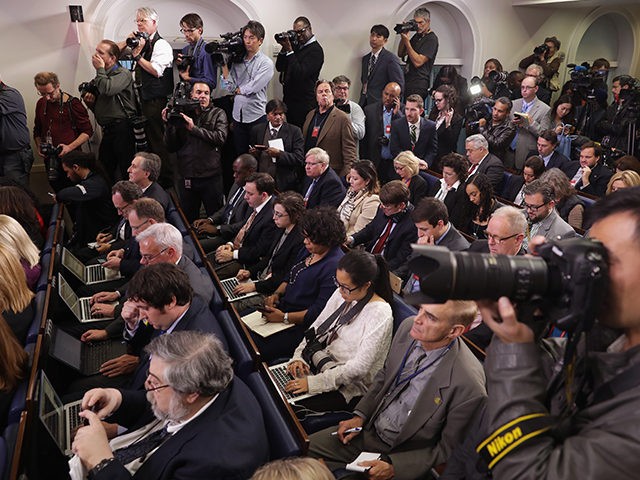“Thank you, Mr. President. During these first 100 days, what has surprised you the most about this office, enchanted you the most about serving this in office, humbled you the most and troubled you the most?”
That was the obsequious question asked by a New York Times reporter during one of President Barack Obama’s first press conferences, in April 2009.
The media were unperturbed by the president’s rough treatment of the Fourth Estate thus far — how his campaign “hijacked” a press plane, with journalists aboard, flying them to Chicago without the candidate; how the campaign attempted to silence a journalist, Stanley Kurtz, when he revealed the truth of Obama’s relationship with former Weather Underground terrorist Bill Ayers; and how Obama aides suggested that the “Fairness Doctrine” be revived in an effort to shut down vigorous opposition from talk radio.
No — Obama was their man, and that was all that needed to be said about press freedom and independence. The Washington Post gushed over a visit from the President-elect in January 2009:
Barack Obama visited the Washington Post to meet the editorial board and national staff, but his tour of the 5th floor newsroom nearly stopped the presses.
Staff writers, photographers, editors and employees from other departments lined the hallway after word spread that the President-elect would be walking through the newroom.
At about 3:15 p.m., Obama entered through a back hallway and began shaking hands, as professional newsmen and women reached over to shake his hand and take pictures. Obama was trailed by advisor David Axelrod, assistant Reggie Love, Post Chairman Donald Graham, Publisher Katharine Weymouth and Editor Marcus Brauchli.
Throughout the Obama administration, the press did little to stand up for the First Amendment — not when Obama froze the White House press pool out of his activities; not when the administration targeted the Associated Press and Fox News reporter James Rosen; not even when President Obama signed the Press Freedom Act but refused to take press questions. Many in the media even cheered Obama’s assaults on the First Amendment in Citizens United and Obamacare’s contraceptive mandate.
So it is difficult, now, to take the mainstream media seriously when they warn of dangers to press freedom and the First Amendment from President-elect Trump. As Politico notes, the Times and Wall Street Journal joined NBC News’ Meet the Press — whose host infamously declared the election over on October 8 — to express their “wariness over the incoming president-elect’s respect for the First Amendment.”
Trump has done nothing to challenge the First Amendment — as Hillary Clinton did, directly. He has called for tougher libel laws, such as those that exist in the United Kingdom (alongside a more vigorous opposition press). He has also feuded often with journalists, who made no secret of their hostility towards him, and frequently distorted reality in a desperate effort to destroy his campaign.
That is all.
The media will need to be vigilant and vigorous during a Trump administration — as they ought to have been during the Obama administration. And it is certainly good news that the Times, among many other outlets, is finally remembering, after more than eight long years, that part of the media’s job is to serve as a check on power.
But guardians of the First Amendment? Hardly.
Joel B. Pollak is Senior Editor-at-Large at Breitbart News. He was named one of the “most influential” people in news media in 2016. His new book, See No Evil: 19 Hard Truths the Left Can’t Handle, is available from Regnery through Amazon. Follow him on Twitter at @joelpollak.

COMMENTS
Please let us know if you're having issues with commenting.